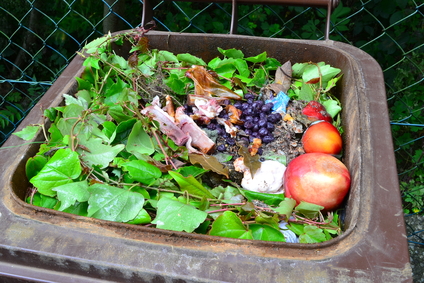|
The thought of a decomposing pile of waste sitting in or near the home might be a little off putting to some people, but it's not nearly as much of a hassle as it may seem at a glance. In fact, compost not only provides health and vitality to your garden and lawn, it plays a major part in cutting down greenhouse gas emissions, landfill overflow and even weed control. You've probably seen scary statistics, like the World Wildlife Fund's study that claims we will need two earths to sustain ourselves by the year 2050, or that the earth's fish supply will run out by the year 2048, but that doesn't have to be the case. As buzzy and ubiquitous as the green movement has become nowadays, there's a reason it's everywhere. According to the EPA, the amount of landfills that exist in the U.S. has been steadily shrinking for the past 20 years or so. This may sound like a good thing, but in actuality we produce more garbage, so the land fills are bursting at the seams with greenhouse gas and sometimes toxic substances. Some landfills, like Cecil County Central Landfill in Elkton, Maryland even require relocation and remediation by third-party companies like Sevenson Environmental. The growing garbage problem is starting to get stinky. Luckily, there's a lot you can do at home to combat it (and look like an earth-saving hero to all your friends), starting with the simple act of composting. Why It's HelpfulThe EPA reports that approximately 17 percent of all methane gas emitted in the U.S. comes from landfills, which lump dangerous refuse with helpful organic material. By starting a compost bin or area for your family, you are lessening toxic contributions to already overcrowded landfills. The EPA estimates that if every household composted their yard trimmings and food scraps, it could reduce the municipal waste stream by up to 25 percent. Furthermore, The United States Composting Council's findings show that for every one ton of composted waste, .25 metric tons of greenhouse gases are prevented. A Sierra Club study concluded that a family of four could easily create 500 pounds of compost in a year. A Quick How-ToDid you know that you can compost egg shells, cardboard pizza boxes, nail clippings, old wool or cotton clothing, bills and even condoms? And the list goes on. All you need is a bin, bucket, soil and motivation to make the world a better place for your children. The recipe for compost is simple: use approximately a 1/1 ratio for soil and scraps, alternating approximately four-inch layers. A properly tended compost bin doesn't smell or breed harmful bacteria, as long as you don't add any fats, meats, dairy or oils. Once you begin your foray into greener pastures, be sure to aerate the soil with holes or earthworms. This also quickens the decomposition process. It is also important to stir your compost intermittently so it doesn't become impacted. From there you can use it to make the most beautiful, nutrient-rich garden that your home could ever need— and the earth will thank you.
1 Comment
12/30/2013 01:46:01 pm
Thanks for sharing it is relevant beneficial information....
Reply
Leave a Reply. |


 RSS Feed
RSS Feed